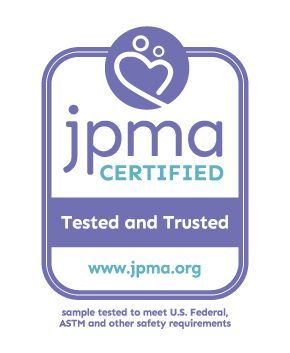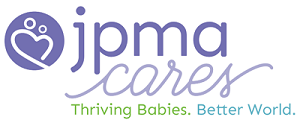JPMA Certified
Tested and Trusted for Your Family
As the voice of the industry on quality and safety for baby and children’s products, JPMA helps you choose and use the best baby products for your family. JPMA's award-winning Certification Program tests more than 2,500 products across 29 different categories to ensure products meet the highest standards for performance safety.
The JPMA Certification Seal on your product or packaging signifies that it has been tested to all federal and state regulations, the voluntary ASTM standard, and other major retailer requirements at an independent, CPSC-accredited laboratory. JPMA Certified products are tested annually to the most recent standards for even more assurance.
The product categories that can be JPMA Certified include:
Baby Monitors
Bassinets/Cradles
Bath Seats
Bath Tubs
Bathers
Bedside Sleepers
Cabinet Safety Locks & Latches
Carriages/Strollers
Changing Tables
Children's Folding Chairs
Crib Mattresses
Expandable Gates & Enclosures
Feeding Booster Seats
Frame Infant Carriers
Full-Size Cribs
Hand-Held Infant Carriers
High Chairs
Infant Bouncer Seats
Infant Floor Seats
Infant & Toddler Rockers
Infant Swings
Infant Walkers
Play Yards
Portable Bed Rails
Portable Hook-On Chairs
Sling Carriers
Soft Infant Carriers
Stationary Activity Centers
Toddler Beds
If a company participates in a given category, then all models in that category are tested and JPMA Certified. In other words, if a company is listed as certified in the carriages & strollers category, then all of that company’s strollers—regardless of style, color, etc.—are JPMA Certified. View the full list of Certification Program participants and their categories on JPMA's Certified Products Directory by
Category or by
Manufacturer.
JPMA Certified products are Tested and Trusted, and they give parents peace of mind when shopping for the safest products for their children. Look for the JPMA Certification Seal when shopping for baby!

Do you have a JPMA Certified crib and need replacement parts? Check for the tracking label! While JPMA certifies products for safety, they don’t manufacture cribs or have replacement hardware. The tracking label for a crib is typically on the inside of one of the crib legs. It will have the following information:
The manufacturer or brand name
Production location
Country of origin
Manufacturing date
Batch number
Once you have this information, you can visit the manufacturer’s website to request replacement parts, review the instruction manual and warnings, and more.
If you have any questions about the JPMA Certification Program or need further information, please contact Jailynn McGhee, JPMA's Certification & Standards Associate at jmcghee@jpma.org or (703) 299-8212.
JPMA Certification FAQs
What is JPMA Certification? What does a JPMA Certification Seal mean?
Baby and children’s products must meet minimum federal requirements based on safety and use. The JPMA Certification Seal signifies a product meets these and additional requirements. To become certified, each product is sample-tested at an independent laboratory to verify it meets the highest standards for safety, performance and functionality.
JPMA Certification is voluntary, and it is based on adherence to ASTM standards, federal and state laws and some retail requirements. The program is designed to provide peace of mind to parents that these products have been independently tested to the most stringent standards.
What chemical testing is included in the JPMA Certification Program?
The JPMA Certification Program tests to all federal and state chemical safety requirements for juvenile products. Our protocols require compliance with all 50 states, regardless of where the product is sold. These requirements restrict chemicals such as lead, cadmium, mercury, antimony, flame retardants, phthalates and more.
What is ASTM? Are ASTM’s standards required?
ASTM International, formerly known as the American Society for Testing and Materials (ASTM), is a globally recognized leader in the development and delivery of international voluntary consensus standards. Today, thousands of ASTM standards are used around the world to improve product quality, enhance safety, facilitate market access and trade, and build consumer confidence. The JPMA Certification Program is built on ASTM standards. ASTM standards do not widely address chemical safety but are focused on performance and general requirements. ASTM standards are voluntary, but the JPMA Certification Program and many federal rules for juvenile products rely on the ASTM standard as the basis for their own requirements.
What is the CPSC? What does it mean to test to CPSIA?
The Consumer Product Safety Commission (CPSC) is the federal agency tasked with regulating consumer products. Despite its huge responsibility, the CPSC does not (and cannot) certify or test each individual product on the market. The CPSC has rulemaking and enforcement tools to help regulate consumer products. Signed into law in 2008, the Consumer Product Safety Improvement Act (CPSIA) gave the CPSC a significant role in creating and enforcing federal requirements as they pertain to children’s products. Testing to CPSIA means that a manufacturer meets or exceeds the federal requirement for their product. All JPMA Certified products must test to the applicable federal regulation.
What is the difference between JPMA Certification and GreenGuard Certification?
There are various differences between the two programs. Primarily, JPMA does not create its own requirements, but rather relies on federal, state, ASTM and major retailer requirements to make up its testing protocol. The JPMA Certification Program is a third-party verifier that a company has met or exceeded all of these safety requirements. GreenGuard Certification is more focused on chemical safety and is in addition to existing regulations. Many JPMA Certification Program participants are also GreenGuard Certified.
What is the difference between JPMA Certification and UL Verification?
Underwriters’ Laboratories, or UL as it is universally known, tests and evaluates a variety of products and components. UL’s label on electronics and small appliances is the most recognizable. It means that the product has been found to be free from a reasonably foreseeable risk of fire or electric shock in most environments. The JPMA Certification Program verifies compliance with the UL program for any products that have an electrical component.
What is Prop 65? Why is there a Prop 65 warning on my baby product?
Proposition 65 requires businesses to provide warnings to Californians about possible exposures to chemicals that cause cancer, birth defects or other reproductive harm. California’s Office of Environmental Health Hazard Assessment (OEHHA) maintains the list of Prop 65 chemicals that it considers harmful, and it updates the list at least once a year. At the latest count, the Prop 65 list contained more than 900 chemicals. These warnings are on a wide range of products and have to be posted in California businesses as well, if applicable. Despite being specific to California, all JPMA Certified products are required to have the Prop 65 warning. For many products, this warning is included if there is the slightest possibility of contamination during the manufacturing process.
What are PFAS? Are juvenile products regulated for PFAS?
PFAS are widely used, long-lasting chemicals, the components of which break down very slowly over time. There are thousands of PFAS chemicals, and they are found in many different consumer, commercial and industrial products—primarily outerwear, cooking pots and pans, and other waterproof or stain-resistant materials. This makes it challenging to study and assess the potential human health and environmental risks. Baby products are regulated for PFAS chemicals, primarily through state laws such as those in California and Colorado. Baby product manufacturers do not intentionally add PFAS to their products, and the JPMA Certification Program is an added level of security to ensure they are compliant with the most current PFAS regulations.
What are phthalates? Are JPMA Certified products tested for phthalates?
Phthalates (pronounced THAL-eights) are a class of chemicals that are used to make plastics flexible [primarily polyvinyl chloride (PVC or vinyl)]. The chemicals also serve various functions in cosmetics, personal care and cleaning products. JPMA Certified products are tested for phthalates, as required by state and federal regulations.
What are flame retardants? Are JPMA Certified products tested for flame retardants?
Flame retardants are chemicals that are applied to materials to prevent the start or slow the growth of fire. They have been used in many consumer and industrial products since the 1970s to decrease the ability of materials to ignite. JPMA Certified products are tested for flame retardants in accordance with various state regulations.
What are VOCs? Does the JPMA Certification Program test for VOCs?
Volatile organic compounds (VOCs) are compounds that have a high vapor pressure and low water solubility. Many VOCs are human-made chemicals that are used and produced in the manufacture of paints, pharmaceuticals and refrigerants. An example is formaldehyde, which is regulated at both the federal and state level. JPMA Certified products are tested for formaldehyde, which is required by the EPA and various states.
Are JPMA Certified products tested for lead, cadmium or mercury?
Yes, JPMA Certified products are tested for lead, cadmium and mercury, which is required by federal and state regulations.
Are car seats tested for chemicals?
The JPMA Certification Program does not currently include a car seat category, as there is no ASTM standard for car seats. Car seats are regulated by the National Highway Traffic Safety Administration (NHTSA). Federal Motor Vehicle Safety Standard (FMVSS) 213, through incorporation of FMVSS 302, requires that car seats have flame retardant properties, and this is often solved by using chemicals. Many car seat manufacturers work to find chemical-free ways to protect families from the risk of fire in vehicles, while still complying with NHTSA’s flame retardancy requirements, and they make certain models or fashions without these chemical treatments. Learn more about car seat safety here.
















